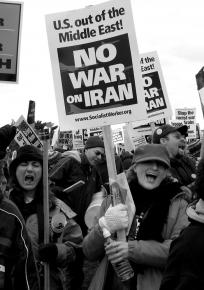U.S. turns the screws on Iran
The Bush administration is leveraging the threat of military strikes on Iran to get other powers to go along with tougher sanctions.
GEORGE BUSH and British Prime Minister Gordon Brown announced at a joint news conference in mid-June that the European Union had agreed to a new round of sanctions aimed at punishing Iran for its alleged nuclear weapons program.
The announcement capped Bush's weeklong European tour and marked a victory for the Bush administration, which has sought to shore up allies for a more aggressive policy against Iran.
The plan calls for freezing the overseas assets of Iran's largest commercial bank and, if Iran refuses to abandon its uranium enrichment program, imposing sanctions on investments in Iran's oil and gas industry--a measure that might be more difficult to implement given skyrocketing oil prices.
Until now, Israel was the only country that could be counted firmly in the Bush camp. Israeli Prime Minister Ehud Olmert announced in early June that he and Bush had "reached agreement on the need to take care of the Iranian threat," declaring to reporters that "George Bush understands the severity of the Iranian threat and the need to vanquish it, and intends to act on the matter before the end of his term in the White House."

But the recent agreement with European countries--such as France and Germany, with their significant investments in Iran--signals that the Bush administration has leveraged the threat of military strikes to impose sanctions as a "reasonable" alternative.
Just six months ago, it seemed a long shot that the Bush administration could accomplish even this. Last year, the U.S. National Intelligence Estimate concluded that Iran had shelved its nuclear program in 2003 and would be unlikely to be able to develop a nuclear weapon until 2015 or later. This stopped the drumbeat for military action.
But a new, more conservative political lineup in Western Europe--in particular, the election of Nicolas Sarkozy as French president a year ago--has favored a harder U.S. line against Iran. The growing consensus between the U.S. and European countries is being facilitated by a U.S. pullback from outright military confrontation.
A U.S. military strike before Bush leaves office could further destabilize Iraq, lead to possible strikes by various regional forces against Israel and Saudi Arabia, and undermine wider Middle East stability. Some analysts predict an attack would push oil prices above $200 a barrel.
Plus, the U.S. is finding that the Arab countries are recoiling from the prospect of a U.S. military assault on Iran. "The U.S. seeks to defend the Arabs from Iran, but they are increasingly trying to defend themselves from the U.S. efforts to defend them against Iran," wrote Ethan Chorin of the Center for Strategic and International Studies in the Financial Times.
Continued saber-rattling, according to Chorin, "is translating into increasing open sympathy on the part of many Gulf Arabs for Iran and increasing skepticism about U.S. efforts to isolate the country."
Still, it's never wise to doubt the Bush administration's willingness to use military force, even if such action is likely to lead a strategic setback. That's why many opposed to Bush's militarism hope for something different from Democratic presidential candidate Barack Obama.
But Obama essentially echoed the Bush administration's Iran policy when he spoke before the American Israel Public Affairs Committee in June. "As president, I will use all elements of American power to pressure Iran," said Obama. "I will do everything in my power to prevent Iran from obtaining a nuclear weapon. Everything in my power to prevent Iran from obtaining a nuclear weapon. Everything."
Chris Hedges, an author and former Middle East bureau chief of the New York Times, denounced Obama's folly:
The failure by Barack Obama to chart another course in the Middle East, to defy the Israel lobby and to denounce the Bush administration's inexorable march toward a conflict with Iran is a failure to challenge the collective insanity that has gripped the political leadership in the United States and Israel.
Obama, in a miscalculation that will have grave consequences, has given his blessing to the widening circle of violence and abuse of the Palestinians by Israel and, most dangerously, to those in the Bush White House and Jerusalem now plotting a war against Iran.
Whether or not a war on Iran is in the offing, the U.S. has succeeded in ramping up pressure against that country in the form of economically damaging sanctions--the same weapon used to cripple Iraqi society for more than a decade before the 2003 invasion.
Antiwar activists need to oppose U.S. imperial aggression in all its forms--and demand an end to sanctions.


